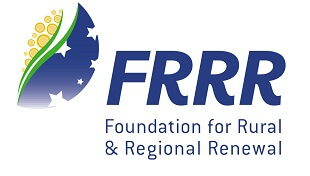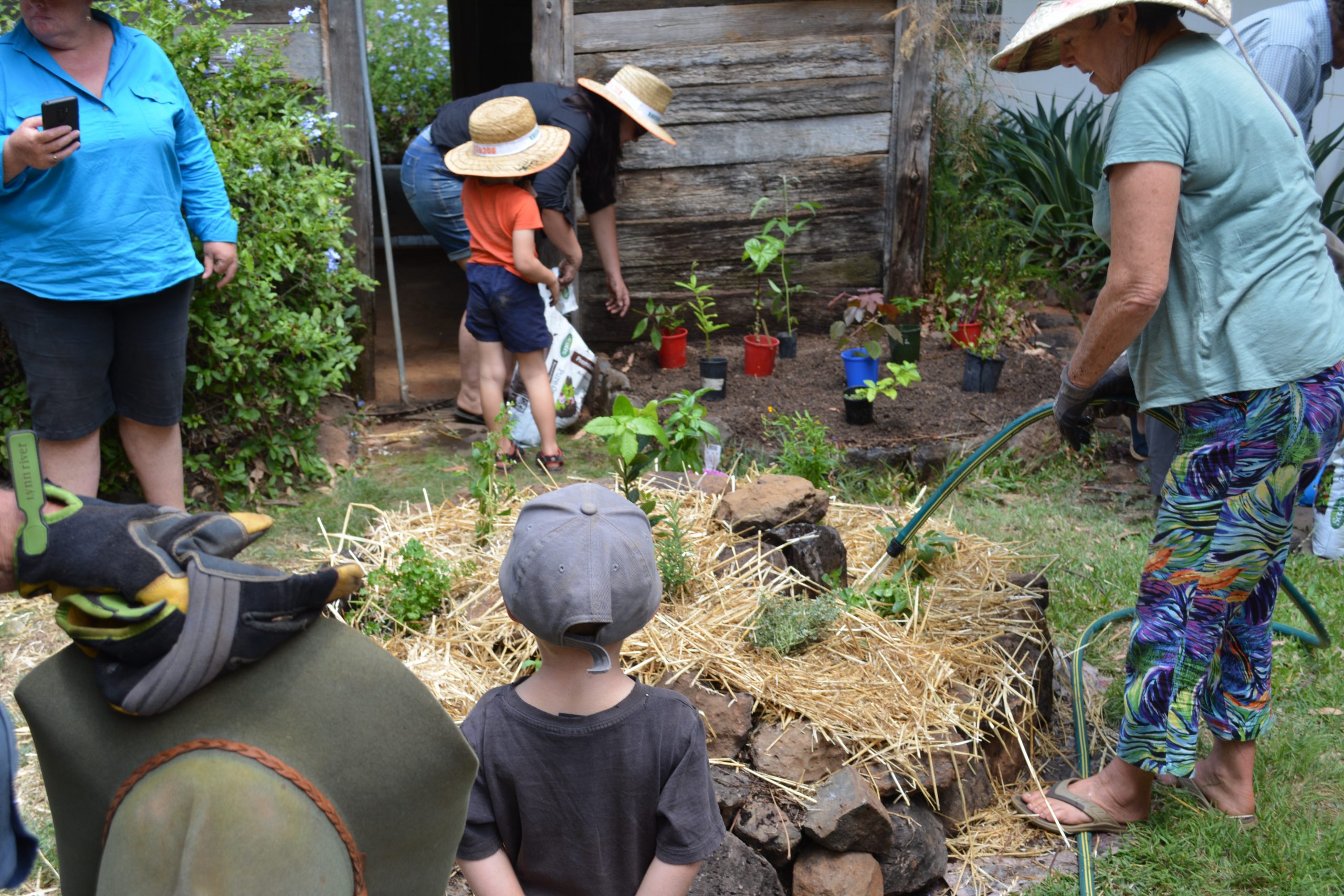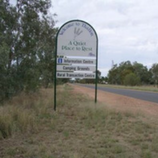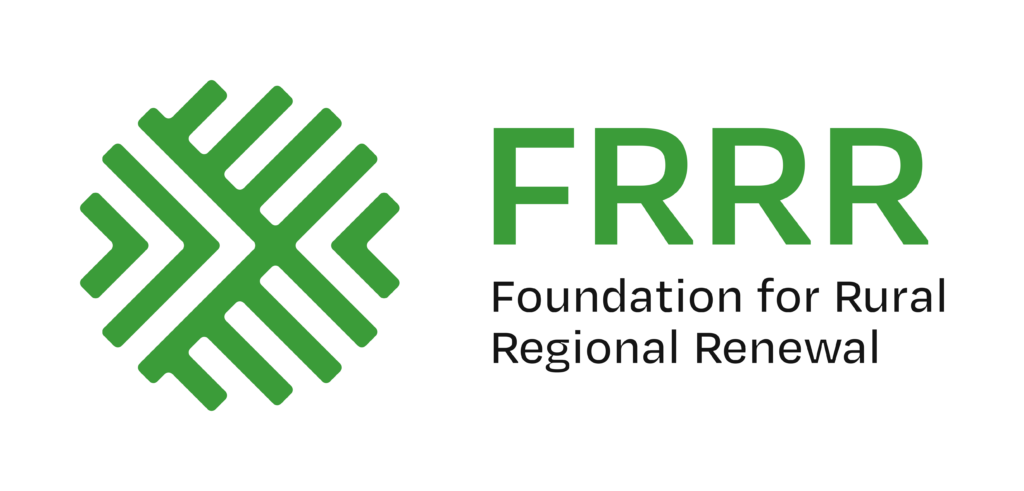Foundation for Rural & Regional Renewal (FRRR)
This week, FRRR unveiled a new brandmark and refreshed colour palette, the first since it was founded in 2000. The work was undertaken by renowned branding agency Houston.

FRRR’s CEO Natalie Egleton says the old brand had served the organisation well, but it was time to change.
“Our aim was to find a new look that reflects the modern, dynamic organisation that FRRR is – and indeed that remote, rural and regional Australia is – and which expresses the connection to rural Australia that is so central to how FRRR works. We think that our new symbol certainly does that. We hope that you come to love it as much as we do,” she said.
While everyone will see it differently, the logo represents:
- four connected forces for good – philanthropy, government, business and community – coming together to create something strong and sustainable, supportive;
- the big picture, taking a helicopter view but also getting to the fine grain, into the detail; and
- forward momentum and positivity, as indicated by the arrows.
FRRR chose to make the primary colour green, for a sense of optimism, renewal and vibrancy, with secondary colours of burnt orange, yellow, sand and the blue of the sky, representing the diversity of remote, rural and regional Australia.
The Tablelands Region is around 150 km south-west of Cairns in Far North Queensland. Drought declared since May 2016, the community has been under significant pressure, specifically the grazing families in the west of the region. The residents in this area are located in remote settings, which can create challenges like difficulty accessing services, social isolation and lack of opportunities. There are very few regular social activities, as these areas are mostly cattle stations run by self-employed graziers.
In the past few years, the Tablelands Regional Council (TRC) and Northern Gulf Resource Management Group (NGRMG) have worked together to deliver a range of drought relief projects that contributed to connectedness, social wellbeing and increased access and awareness to support services.
They teamed up again to provide a series of gardening workshops to people in areas that have been drought declared to bring them together for new learning experiences that assist in their empowerment and resilience during difficult times, in a bid to promote social cohesion and wellbeing.

A $15,000 Tackling Tough Times Together grant, funded by the Tim Fairfax Family Foundation, enabled TRC to consult and engage gardening experts to design and deliver the workshops. The funding also covered ancillary costs such as the promotion of the events, catering and workshop materials.
In all, four drought-resilient gardening workshops were held, two at Pinnarendi Station and two at Woodleigh Station. The first workshops were held in November 2018 and were attended by 26 participants. The focus was on learning how to build a spiral herb garden utilising existing materials (upcycling) from around their properties. This included preparing the bed and understanding the design benefit for water-saving and planting complementary and seasonal plants, as well as making fertiliser out of existing resources.
The next round of workshops was held in May 2019, and 14 participants learnt to build wicking beds (self-watering gardens) and salad baskets out of hay bales.
Additionally, a morning/afternoon tea was held at each of the stations to discuss what they had learnt, evaluate the workshops and see how they would take any learnings into the future.
Project outcomes from the gardening workshops were significant for the participants who all stated in their evaluation that they had reconnected with old friends socially, and made new connections. From the beginning of the first workshop, participants were looking to increase their skills and knowledge. They reported that the benefit of receiving some plants to take home reinforced their commitment to translate their learnings to their gardens and build garden beds. The participants learnt to utilise their resources in different ways, which increased feelings of empowerment, as well as building resilience and sustainability.
Many of the participants have kept up their gardening and are noticing benefits for their whole family, including healthy living, self-confidence, new social connections, cost efficiency, self-reliance and wellbeing. Participating in the workshops has developed additional common ground between the participants and the community, which increases their social cohesion. Both groups decided to continue their gardening groups and rotate morning teas at each other’s gardens to maintain the connection and interest in their projects.
From all accounts, it certainly sounds as though the project succeeded in inspiring and empowering isolated communities to have some control to support their mental health with activities that are also coping strategies for personal challenges. One participant commented, “The workshops were wonderful opportunities for gardeners (of all levels) to get together; wellness at its best, thank you again!”
Thallon is a small town with a population of around 260, located 600 km west of Brisbane in south west Queensland. It’s a close-knit community and local residents like to stay in town, or move into town off surrounding farms, as they age.
However, there are no dedicated aged care facilities or purpose-built independent living units, so people either move into regular housing or go to larger centres. The community has agreed that this is a situation they want to rectify and has prioritised the creation of a community-owned independent living units.
The Thallon Progress Association (TPA) is lead the economic development organisation in town, and has members from all community organisations, including Council, represented.
They have a successful track record of getting things done for the community, including working with the Balonne Shire Council to equip the local recreation grounds with infrastructure required for Thallon to be designated an RV friendly town, as well as being the driving force behind the impressive local silo art and the newest ‘big thing’ – the giant statue of a Northern Hairy Nose Wombat, both of which are important tourism draw-cards.
Despite having no experience in this area, they agreed to act as the lead on the development of an Independent Living Unit complex to provide options for local citizens to age in place, with support of their family and friends.
Professional advice breaks down complexity
Anything to do with aged care is complex, and the TPA wisely decided their first step would be to get independent legal advice about setting up a fit-for-purpose legal entity to own land, develop the infrastructure and oversee the management of the complex and the services it will offer.
However, they needed external funding to cover the costs.They received an FRRR Caring for Ageing Rural Australians (CARA) grant of $7,032, funded by the Sylvia and Charles Viertel Charitable Foundation. This enabled them to engage local solicitors and obtain specialist advice on the most suitable legal structure for this aged-care initiative.
As a result, Thallon Community Services Ltd has been set up as a registered company. It has an ABN and is now registered as a Charity. The Company has a sole member (Thallon Progress Association) and an initial Board of three Directors, who report to the Association at their AGM.
A suitable parcel of land has been identified and now the real work begins, as Thallon Community Services Ltd aims to improve the well-being of all citizens by creating hope and opportunity, enhancing social inclusion and independence, addressing the impact of disadvantage and improving the districts’ liveability.
In their acquittal report, TPA acknowledged their appreciation of the grant, saying that it had allowed them to lay the foundations and establish a structure suitable to grow their strong community forward. They also indicated that without this grant, the project would not have gone ahead.




